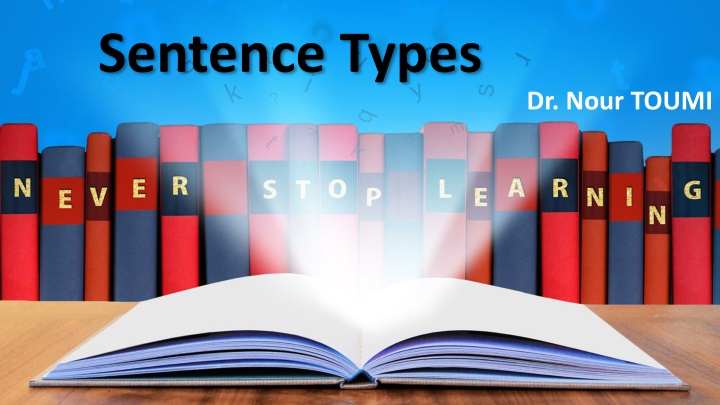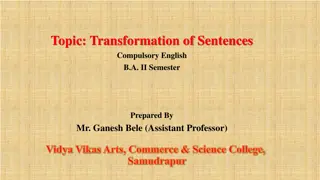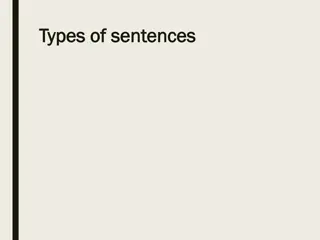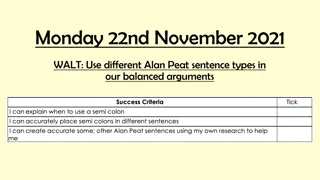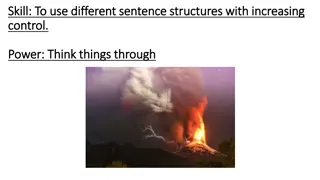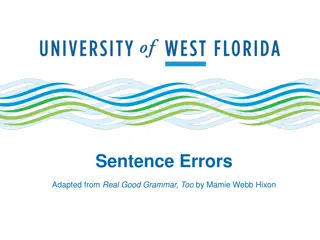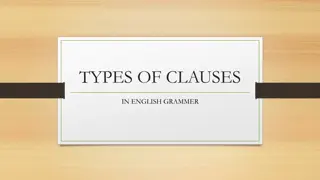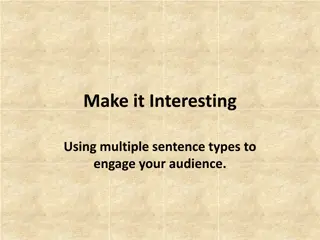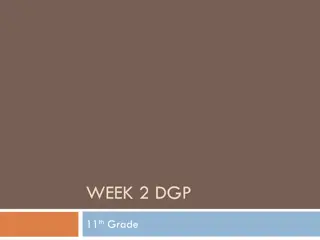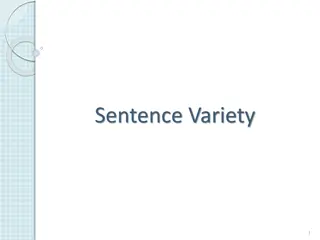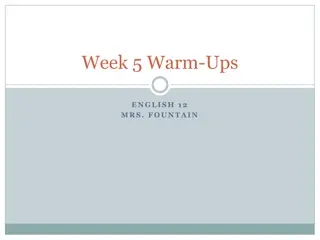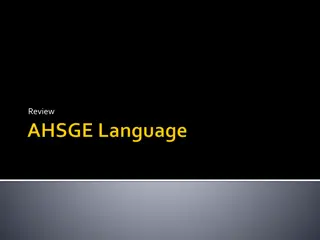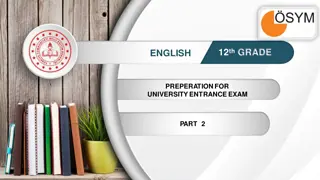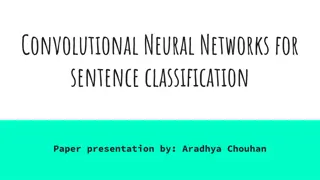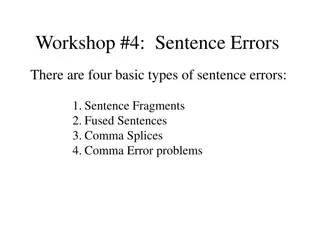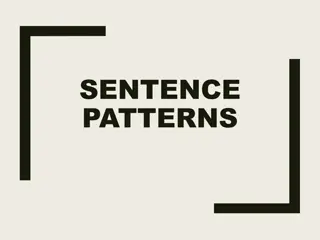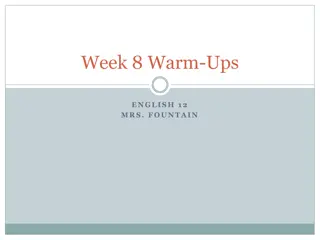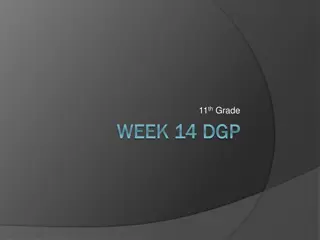Sentence Types
Explore different types of sentences, including declarative, imperative, exclamatory, and interrogative. Learn to distinguish between dependent and independent clauses and practice writing sentences with varying structures.
Download Presentation

Please find below an Image/Link to download the presentation.
The content on the website is provided AS IS for your information and personal use only. It may not be sold, licensed, or shared on other websites without obtaining consent from the author.If you encounter any issues during the download, it is possible that the publisher has removed the file from their server.
You are allowed to download the files provided on this website for personal or commercial use, subject to the condition that they are used lawfully. All files are the property of their respective owners.
The content on the website is provided AS IS for your information and personal use only. It may not be sold, licensed, or shared on other websites without obtaining consent from the author.
E N D
Presentation Transcript
Sentence Types Dr. Nour TOUMI
Objectives 1. Identify the different sentence types in terms of function and structure. 2. Understand the difference between dependent and independent clauses. 3. Write appropriate sentences with varying structure.
Imperative declarative Four types of sentences (function) Exclamatory Interrogative
Declarative A declarative sentence "declares" or states a fact, arrangement or opinion. A declarative sentences ends with a period (.). Examples 1. I'll meet you at the train station. 2. The sun rises in the East. 3. This is a museum
Declarative sentences can be either positive (affirmative) or negative. Negative sentences are formed by means of the negative particle not which is put after the verb (auxiliary, modal, link verb). E.g. I do not like rainy weather.
Negative pronouns (no-one, none, neither, nothing, no, etc.), negative adverbs (never, nowhere, etc.) and some other words (hardly, refuse, without, etc.) are also used to express negation. Note! There is only one negation in an English sentence. E.g. She never walks alone.
Imperative The imperative commands (or sometimes requests/invitations/direction). The imperative takes no subject as 'you' is the implied subject. The imperative form ends with either a period (.) or an exclamation point (!). Examples 1. Open the door. 2. Finish your homework 3. Please consider my application for the internship. 4. Turn to Table 1 in the appendix
Interrogative The interrogative asks a question. In the interrogative form the auxiliary verb precedes the subject which is then followed by the main verb (i.e., Are you coming ....?). The interrogative form ends with a question mark (?).
Examples 1. How long have you lived in France? 2. When does the bus leave? 3. Do you enjoy listening to classical music? 4. What is the true meaning of the poem? 5. What will this study mean to medical research in a decade?
Exclamatory The exclamatory form emphasizes a statement (either declarative or imperative) with an exclamation point (!). Examples 1. Hurry up! 2. That sounds fantastic! 3. I can't believe you said that!
It can also express some kind of emotion or feeling (joy, anger, grief, wonder, etc.). It often begins with the words What and How . E.g. 1. How wonderful! 2. What fine weather we are having!
Simple Compound Four types of sentences (structure) Complex Compound- complex
Simple sentences A simple sentence contains one independent clause. An independent clause consists of a subject, a verb (or compound subjects or verbs), and sufficient meaning to stand on its own as a complete idea.
A simple sentence can have one of several possible "formulas." The subject(s) in each sentence are underlined with one line. The verb(s) are coloured. 1 . The Star Wars movies were international hits. 2. Young people and adults enjoyed them. 3. The films entertained and thrilled audiences everywhere. 4. Luke Skywalker and his friends battled evil and made us laugh at the same time.
5. The baby cried for food. 6. Professor Maple s intelligent students completed and turned in their homework. (A simple sentence does not necessarily have to be short. It can have adjectives. In this case, there are two verbs completed and turned in. However, the sentence expresses one complete thought and therefore is a simple sentence.) 7. Megan and Ron ate too much and felt sick.
Notice that the subject in a simple sentence may have two or more items (sentences 2, 4 and 7). The verb may have two or more items (sentences 3, 4, 6 and 7) . These are all simple sentences because there is only one subject-verb pair
Subject verb agreement You already know that subjects and verbs agree in number. Examples: My sister is married. (singular) My sisters are married. (plural) My brother and I are single. (plural)
Subject-verb agreement is sometimes confusing in the following situations. 1 . When a sentence begins with the word there + the verb be, the subject follows the be verb. Examples: There isa student in the hall. (The verb is is singular to agree with a student.)
There arethree students in the hall. (The verb are is plural to agree with three students.) There wasno reason for his action. There were many reasons for his success
A prepositional phrase (a group of words beginning with a preposition such as of, with, in, at, or on and ending with a noun or pronoun) can come between a subject and its verb. Prepositional phrases may come after a subject, but they are not part of the subject. You should mentally cross them out when you are deciding if the verb should be singular or plural.
1. One (of my sisters) is a singer. (The subject is one, not sisters.) 2. The color (of her eyes) changes when she is angry. (The subject is colour, not eyes.) 3. Six kinds (of rice) are available in the grocery store. (The subject is kinds, not rice.)
Some words are always singular. Examples: 1. One (of my brothers) is a musician. 2. Neither (of my parents) is living. 3. Much {of my time) is spent in the library. 4. Each {of my brothers) wants his own car. 5. Either (of my sisters) is able to baby-sit for you tonight. 6. Nothing ever happens in my life. 7. Is anyone home?
Few words are always plural. Examples: 1. Both {of my parents) are teachers. 2. Several (of the teachers) speak my language. 3. Many {of my friends) work in the library.
Few words can be either singular or plural. In these cases, you must refer to the noun in the prepositional phrase. Examples: 1. Some {of the money) was missing. (singular) 2. Some (of the students) were missing. (plural) 3. All {of my time) is spent in the library. (singular) 4. All {of my brothers) are singers. (plural)
5. Most {of the ice) was melted. (singular) 6. Most {of the ice cubes) were melted. (plural) 7. A lot {of the work) was too easy. (singular) 8. A lot {of the people) were angry. (plural) 9. None {of the fruit) is fresh. (singular) 10.None {of the apples) are fresh. (plural)
Compound sentences A compound sentence is composed of at least two simple sentences (independent clauses) joined by a comma and a coordinating conjunction (and, but, so, yet, or, for, nor)
Examples: 1. The shoplifter had stolen clothes, so he ran once he saw the police. Both sides of the conjunction so are complete sentences. The shoplifter had stolen clothes can stand alone and so can he ran once he saw the police. Therefore, this is a compound sentence. 2. They spoke to him in Spanish, but he responded in English. This is also a compound sentence that uses a conjunction to separate two individual clauses.
3. She wanted to go on vacation, so she saved up her money. 4. I like apples, but my sister loves bananas. 5. Tim loves to read, and he also loves to hike. 6. The company had an excellent year, so they gave everyone a bonus. 7. I went shopping, and my wife went to her classes.
Use a comma before a coordinating conjunction in compound sentences only. Do not use a comma to join two words or two phrases in a simple sentence. Examples:
Yesterday we went shopping, but we didn't buy anything. The stores were crowded, and they were noisy. We ate lunch, and then we went home. Yesterday we went shopping but didn't buy anything. The stores were crowded and noisy. We ate lunch and then went home.
Complex sentences Independent Complex sentence Dependent
an independent clause (a clause that can stand alone as a simple sentence) must have a subject, a verb, and complete meaning. A dependent clause also has a subject and a verb, but it does not have sufficient meaning to allow it to stand alone. It is dependent on an independent clause to complete its meaning. When using a subordinating conjunction to combine clauses, we actually start out with two independent clauses, each of which can stand on its own but is related to the other
Example The ship returned to port. Its propeller was broken. The information in each of these independent clauses is considered of equal value or importance. In reality, however, the first clause is considered the more important piece of information. It is more important to know that the ship had to return to port. Why it had to return is of secondary importance. To let the reader know which clause is of primary importance, the writer can make one of the independent clauses a dependent clause by adding a subordinating conjunction to the front of the clause. Example Because its propeller was broken.
Notice that this clause no longer can stand on its own because it does not have sufficient meaning. It is dependent on the independent clause for its complete meaning. Here Is the Complete Sentence The ship returned to port because its propeller was broken. (independent clause) (subordinating conjunction) (dependent clause)
Subordination, then, is a process for making one idea of lesser value or importance than another idea. Subordination is commonly done when there are two independent clauses and the writer decides that one main idea is actually more important or needs more emphasis than the other main idea.
A dependent clause always begins with a subordinating word, or subordinator. There are different kinds of subordinators. Time subordinators begin a clause that tells when something happens. Reason subordinators begin a clause that tells why something happens. Place subordinators begin a clause that tells where something happens or where something is located.
Time subordinators after He goes to school after he finishes work. as Several overcrowded buses passed as we were waiting. as soon as She felt better as soon as she took the medicine. before Before you apply to college, you have to take an entrance exam. since It has been a year since I left home. until We can't leave the room until everyone has finished the test. when When you start college, you sometimes have to take a placement test. whenever Whenever I don't sleep well, I feel sick the next day. while Several overcrowded buses passed while they were waiting.
Reason subordinators because Jack excels at sports because he trains hard. Since Since she works out daily, Jill is in great condition. as As they want to compete in a marathon, they run every day.
Place subordinators Where I can never remember where I put my house keys. wherever A baby animal follows its mother wherever she goes.
Compound-complex A compound-complex sentence combines complex sentence and compound sentence forms. Compound - complex sentences contain at least one dependent clause and more than one independent clause. The clauses are connected by both conjunctions (i.e., but, so, and, etc.) and subordinators (i.e., who, because, although, etc.)
Examples: 1. After the two soccer players lost their game, they joined their other teammates for lunch, and they went to the movies. If we remove the dependent clause after the two soccer players lost their game, we have a compound sentence. The dependent clause makes this sentence compound-complex. 2. The man believed in the system, and he knew that justice would prevail after the murderer was sent to jail.
3. The bird landed on the branch, and it warbled a beautiful song while the cat crouched on the ground below. 4. If the team wins the game, the students will first cheer the athletes, and then they will head into town for pizza and hamburgers 5. Although she felt guilty for missing her friend s birthday, she took her out to dinner the next day, and they had a great time.
6. John, who briefly visited last month, won the prize, and he took a short vacation. 7. Jack forgot his friend's birthday, so he sent him a card when he finally remembered. 8. The report which Tom complied was presented to the board, but it was rejected because it was too complex. 9. I try to eat healthy food, but because fast food is so convenient, I cannot maintain a healthy diet. 10. If he got the job, he would have to commute 50 miles to work, so he decided the job was not worth it.
